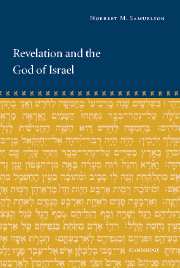Book contents
- Frontmatter
- Contents
- Acknowledgments
- Introduction
- PART I THE GOD OF REVELATION
- PART II IS THE GOD OF REVELATION BELIEVABLE?
- 5 The challenges of political ethics – issues of racism and the irrational
- 6 The challenges of modern science
- 7 The challenges of modern philosophy – rethinking God
- 8 Are the Hebrew Scriptures revealed?
- Conclusion
- Works cited
- Index of names
- Index of subjects
5 - The challenges of political ethics – issues of racism and the irrational
Published online by Cambridge University Press: 22 September 2009
- Frontmatter
- Contents
- Acknowledgments
- Introduction
- PART I THE GOD OF REVELATION
- PART II IS THE GOD OF REVELATION BELIEVABLE?
- 5 The challenges of political ethics – issues of racism and the irrational
- 6 The challenges of modern science
- 7 The challenges of modern philosophy – rethinking God
- 8 Are the Hebrew Scriptures revealed?
- Conclusion
- Works cited
- Index of names
- Index of subjects
Summary
TRUTH TESTS: CONSISTENCY, COHERENCE, AND HISTORICAL FALSIFICATION
How are we to judge the truth value of a worldview such as the ones considered in the first part of this book? A first test is whether the view is consistent and coherent. To the extent that it is not, it is problematic. “Problematic” does not mean that it is not true. There may be much in it that does deserve consent, but all of it cannot be affirmed, at least not without reservations. The assumption underlying this judgment is fundamental to reasoning. Two clear statements that contradict each other cannot both be true. They may both be false or one of them may be true, but not both. The views considered in part i were sufficiently sophisticated philosophically, including the worldview of the Hebrew Scriptures, to pass at least this first test. However, it is only a first test. A view that is consistent and coherent may be true (i.e., it is possibly true), but that does not mean that it is true. The biblical worldview, understood in the literal or plain sense of the text, was judged false not because it is inconsistent or incoherent in itself but because it was not consistent with observed facts.
The critical fact underlying its rejection in Jewish history was that the nation of Judea fought three wars against the pagan Romans in order to preserve and defend the legal system of the Torah; in all three cases the pagans defeated the Torah-true Jews, and this fact is inconsistent with central claims in the Hebrew Scriptures about the meaning of history – that those who obey the Torah will receive material rewards in this world and those who disobey the Torah will receive material punishments.
- Type
- Chapter
- Information
- Revelation and the God of Israel , pp. 93 - 120Publisher: Cambridge University PressPrint publication year: 2002

